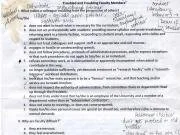See You Next Week
The storm of passion once over, he would have given worlds, had he possessed them, to have restored to her that innocence of which his unbridled lust had deprived her. Of the desires which had urged him to the crime, no trace was left in his bosom. The wealth of India would not have tempted him to a second enjoyment of her person.
—Matthew Lewis, The Monk
Don’t worry while you’re gone. I won’t riffle the drawers of lacy negligees or search for porn or evidence of perversion. Instead I’ll go straight to your books. How rare, these instances of being in your house without you there, and so I’ll take advantage of the silence. Breaking and entering was once a pleasure for this adolescent reason, to know another’s life, or its furnishings at least, but this time I have the key. You asked me to feed the cats. So I have fed the cats, cleaned out the mechanical turk of a litter box you seem to find necessary. Now they are distracted and I can run my hands along your spines, imagine these vertebrae a finger at a time, tip out a couple titles without losing their place, try to parse the logic of your collection.
Not a library for lending, though I’m sure if I asked, you’d happily let me borrow. And not all yours, I noticed. One of them, your father’s, judging from the bookplate: Towards the Sociology of Knowledge, edited by Gunter W. Remmling. Another from the university library. Did you forget it here at home? Once I forgot a set of dirty Polaroids in Lawrence Ferlinghetti’s The Coney Island of the Mind. Was I freer then, I wonder?
Your wife’s shelves intrigue me more. Yours overlap well enough with mine, our subjects familiar if not intimate, but hers are often in Italian or translation, thus more exotic, and her marginalia more abundant, frenzied, and explicit. We think of our intellectual lives as a public good here in the academy—how dull that sounds, like tolling bells, the drear of days, echo chambers filled with dust, and such isolation!—but for us the bookshelf is a private space. Marginalia might be plundered by a rival to scoop a dissertation, eviscerate a reputation. What we do is not dramatic until something ruptures, maybe desires take hold of us, and we act, the world breaks, and so do we.
Here Lewis’s The Monk recounts “the diabolical decline of Ambrosio, a Capuchin superior, who succumbs to temptations offered by a young girl who has entered his monastery disguised as a boy, and continues his descent with increasingly depraved acts of sorcery, murder, incest and torture.” Inside I find a memo from the administration on “Troubled and Troubling Faculty Members”—an intended pairing or a happy circumstance? That sort of faculty member “does not act professionally with students,” the memo advises, and (you adorned this with a star) “refuses committee work, or is obstructionist or apparently incompetent,” as if to elevate these sins together: lust and sloth or maybe spite. What are your sins? What are mine? Our breaking points? Do we share them? Might they share a page in this book, this space, your shelf, your self, both of ours, these hours we carve out to spend with others’ words, those nether worlds?
(for Paul & Aileen)

